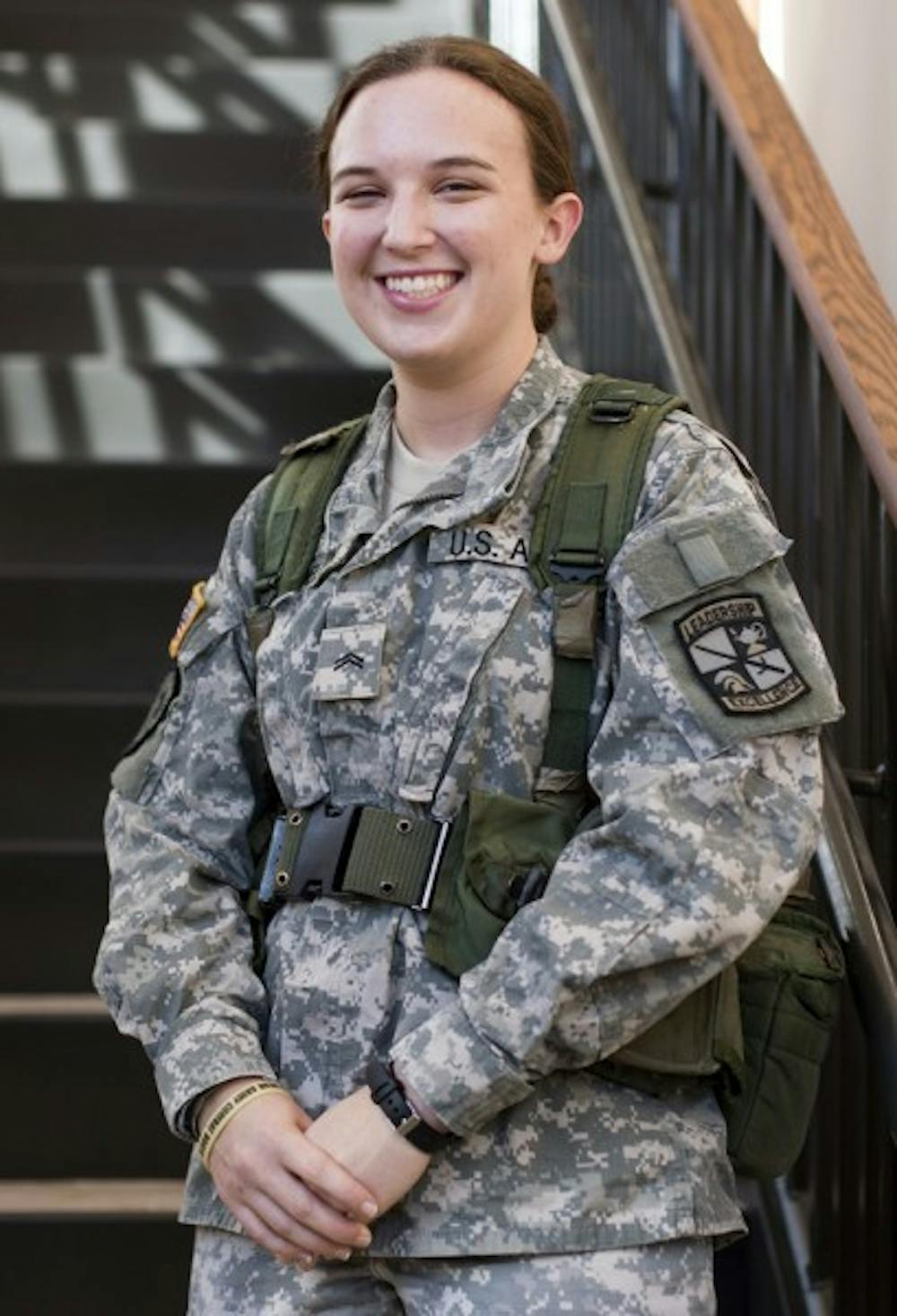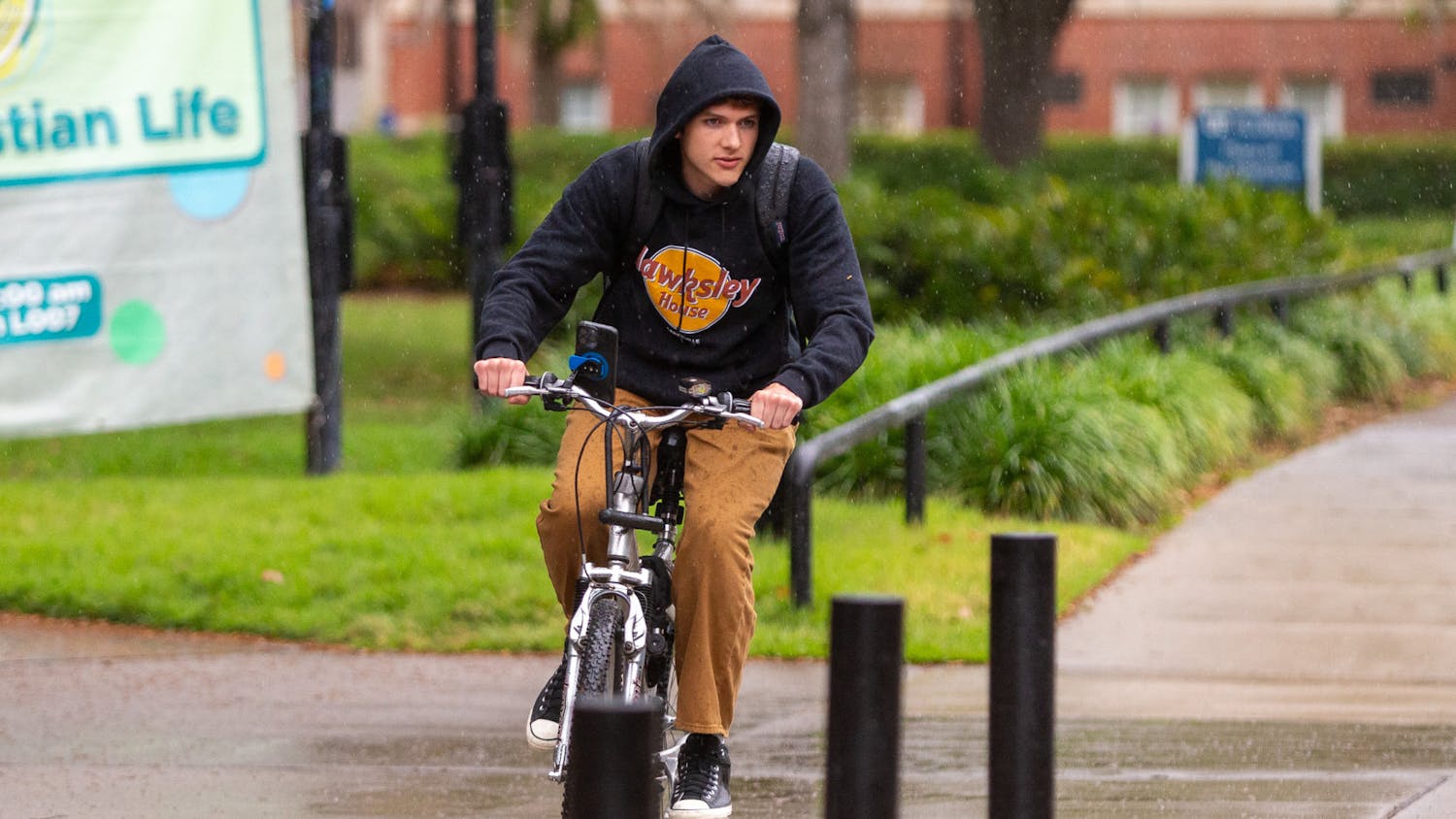Rachael Pendleton's alarm clock runs five minutes fast so she's never late. She plans her busy life down to the minute.
But that doesn't soften the 5 a.m. wake-up call for ROTC physical training.
It's still dark outside, but Pendleton gets out of bed quickly. She throws on her gray Army shirt and high-waisted black shorts. She laces up her running shoes. A quick swipe of concealer hides the dark circles under her eyes from lack of sleep. A touch of mascara — waterproof, so it won't run when she sweats. Off she goes.
But Pendleton doesn't complain. It's all part of the plan.
The 21-year-old UF junior is completing two years of ROTC training in one. She's studying to help soldiers suffering from post-traumatic stress disorder. She plans to contract, or commit, to serve for a designated amount of time with the Army.
On top of that, Pendleton works about 15 hours a week at the Gator Wesley Foundation and takes 17 credit hours of class.
Until last semester, she was a UF psychology major intending to be a clinical psychologist. When a friend recommended nursing, Pendleton thought the suggestion was "funny and wouldn't fit."
Despite her reservations, Pendleton went to see her advisers. She wanted to have as much one-on-one time with patients as possible. To her surprise, advisers said her goals aligned with those of a psychiatric nurse practitioner, something she'd never considered before.
As a psychiatric nurse, she could prescribe medications, develop treatment plans and interact with patients daily.
Pendleton knew she wanted to work with PTSD victims because she could make a difference.
"So many veterans have PTSD that didn't get the help they needed," Pendleton said. "It ruins their lives and the connection with their families."
The number of soldiers returning from combat is becoming so large that soon there won't be enough nurses to treat them. The shortage, according to a report by the American Association of State Colleges and Universities, could reach 800,000 by 2020.
In addition, one in every five veterans returning from Afghanistan or Iraq reports symptoms of PTSD or major depression, according to a 2008 study from the RAND Corp. About half of those 300,000 people have sought treatment.
Pendleton wants to help.
When some soldiers return, they have nightmares and flashbacks that force them to constantly relive the war they thought they left behind.
"You see a lot of soldiers come home, and they might come home in one piece," Pendleton said. "But if they're not the same person, there's still a problem."
She had a choice: enter the Army after completing nursing and graduate school or join UF's ROTC program, which allows students to train in military sciences for four years and serve after graduation. In return, the Army will help fund her education.
"ROTC was the best choice," Pendleton said. "They understand that I'm a student right now and work with me."
After discussing her options with UF Army recruiting officer Lt. Col. Bob Quint, she joined ROTC last fall.
Pendleton takes military science classes, attends 6 a.m. physical training sessions and goes to a weekly leadership lab. She learns small-unit tactics as part of the Raiders, which trains members to think quickly in dire situations.
She runs, sprints and does bear crawls and push-ups. She now knows how to throw a grenade, how to walk in formation and how to call for emergency evacuation of a casualty on the battlefield.
In August, it took Pendleton 21 minutes to run two miles. Now, it takes her 16 minutes, 59 seconds.
Pendleton adjusted well to the ROTC program, Quint said.
"She loves it," he said. "I see it in her eyes."
"It is a lot of work, even now," Pendleton said. "But I don't mind it because I know that it's working toward something that I know I'll love doing and I'll find rewarding."
Pendleton expects to serve at least eight years in the Army.
"The satisfaction of taking care of soldiers and their families attracts a special kind of nurse," Quint said, adding that her compassion, perseverance and positive attitude will make her an "outstanding nurse."
"Rachael is a ‘Hooah' kind of person," Quint said, using an Army term that often describes a dedicated soldier.
"Let's-rock-'n'-roll-and-get-it-goin' is Rachael Pendleton."
Rachael Pendleton, 21, is completing two years of ROTC training in one so she can join the Army as a psychiatric nurse practitioner.






